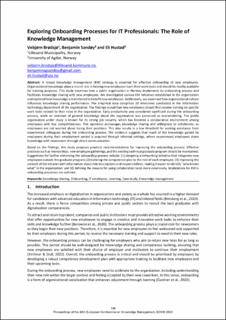Exploring Onboarding Processes for IT Professionals : The Role of Knowledge Management
Chapter, Peer reviewed
Published version
Permanent lenke
https://hdl.handle.net/11250/3119214Utgivelsesdato
2023Metadata
Vis full innførselSamlinger
Originalversjon
Brødsjø, V., Sandøy, B. A. G. & Hustad, E. (2023). Exploring Onboarding Processes for IT Professionals : The Role of Knowledge Management. In F. Matos & Á. Rosa (Eds.), Proceedings of the 24th European Conference on Knowledge Management (24(1), pp.148-158). Academic Conferences International Limited. https://doi.org/10.34190/eckm.24.1.1370Sammendrag
A robust knowledge management (KM) strategy is essential for effective onboarding of new employees. Organizational knowledge plays a crucial role in helping new employees learn their work tasks and should be readily available for training purposes. This study examines how a public organization in Norway implements its onboarding process and facilitates knowledge sharing with new employees. We investigated various KM initiatives established in the organization and explored how knowledge is transferred to benefit new employees. Additionally, we examined how organizational culture influences knowledge sharing performance. The empirical data comprises 20 interviews conducted in the information technology department of the organization. The findings reveal that new employees should first receive training on specific work tasks related to their roles in the organization. Early productivity was considered significant during the onboarding process, while an overload of general knowledge about the organization was perceived as overwhelming. The public organization under study is known for its strong job security, which has fostered a collaborative environment among employees with low competitiveness. This openness encourages knowledge sharing and willingness to collaborate, as employees are not worried about losing their positions. This also results in a low threshold for seeking assistance from experienced colleagues during the onboarding process. The evidence suggests that much of the knowledge gained by employees during their employment period is acquired through informal settings, where experienced employees share knowledge with newcomers through direct communication. Based on the findings, this study proposes practical recommendations for improving the onboarding process. Effective practices such as mentorships, new employee gatherings, and the existing technical graduate program should be maintained. Suggestions for further enhancing the onboarding process include: (1) designing a networking initiative that integrates new employees outside the graduate program; (2) tailoring the competence plan to the role of each employee; (3) improving the content of the intranet with information about role descriptions and responsibilities, making it easier to identify "who knows what" in the organization; and (4) defining the reasons for using collaboration tools more extensively. Implications for KM in onboarding processes are outlined.

